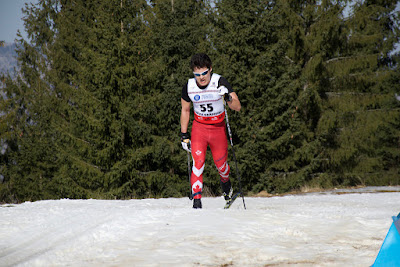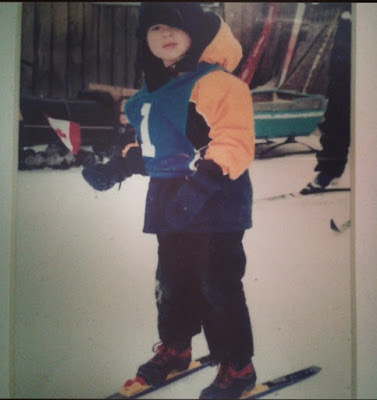 |
| Start of the trails |
 |
| Rest afternoon exploring Innsbruck |
 |
| Innsbruck |
Unfortunately I found myself pretty tired and riding the border of getting sick, so I was not able to put the hours in I would have liked to in Seefeld to prepare myself for the races. It was a good lesson not to underestimate how much big travel days can ware you out. None the less it was an amazing short stay in Seefeld but after 5 days it was off to Romania for the races.
 |
| Travel day flex, croissant munchin' |
On a positive note the accommodation was super cool, there were 3 main hotels and a few smaller ones with one common dining hall. It was the whole worlds community staying at the a resort on top of this mountain range, pretty neat.
 |
| Stadium a few days before race (photo: Jenn) |
 |
| Stadium on first official training day (photo: Jenn) |
 |
| Busy stadium (photo: Jenn) |
 |
| Team Jackson |
 |
| (photo: Angus Foster) |
 |
| ow (photo: Angus Foster) |
The next race was the 15km skate interval start (changed from mass start skiathlon due to lack of snow). It was a race that I was really looking forward to, but things just did not come together for it. I believe that it was a solid race, but I was a just slightly off form and struggled to work the transitions and flat sections. But I learned a lot from this race, but the big one was at this next level of competition, if you aren't on form or you have an off race, you get dropped. It was a real wakeup call to really emphasize that every stride, every push, every effort made in the race counts.
The day after was the final race of worlds, the 4x5km relay. Going into worlds this was probably the race I was most excited for, there is something about racing together as a team that takes skiing to a whole new level of fun. Unfortunately, none of us were on form - at all. The four of us all struggled pretty hard. I wound up anchoring the relay and was feeling pretty confident about it, but it was then I learned just how hard you can die in a race as short as 5km. I was closing the small gap between us and the German team member for the first 2.5km, I felt quite strong. But when he accelerated into the second lap, I hit an unbelievably hard wall... in a nutshell I lost a lot of time and it was a very long 2.5km to the finish. We are 4 very strong skiers and made a great team, and I do not think our result was not an accurate demonstration of what we are capable of.
It was somewhat annoying to recognize that I wasn't racing at my best when it was time to show what I had to the rest of the world, it was frustrating to know that I was racing faster and felt stronger in Canada than I did at World Juniors. But none the less it is all part of the experience, it was my first World Junior Championships and as a stated in my last blog, part of being a good skier is being able to show up and perform at a high level whether you feel great or terrible ... and it is something that I definitely need to keep working on, especially at the international level. A work in progress, a goal to strive for.
The more I look back on the experience as a whole, the more I realized I learned from it. It important to remember how cool it was. And how there is no shame in not being a top dog at worlds. Worlds is essentially all of these countries selecting 4-5 of their top juniors, and throwing them into a race, these people are no joke, it's the real deal. Seeing how results played out it makes me ask the classic question, what makes some of these Scandinavian countries so much stronger, consistently, than us. Seeing them there made me realize that they are just people, they aren't super humans, so what makes them that couple steps faster?
There is likely an endless list of reasons, but lets reflect on it. My coach Ron made a very strong point in this discussion, and that is how skiing over there is extremely popular, thus a lot of talented kids are introduced to the sport. Just like how in Canada we have so much talent going into sports like hockey. Another point which is sort of related to this, is the depth of the fields in places like Norway. There are so many people racing at every level there, from what my teammates told me, and by looking at results, yes there are insanely fast skiers there, but there are also rather slow skiers there. The difference is there are hundreds of skiers in-between covering every level of competition. In Canada, if I was say, 2 minutes off the leader in a 15km, I would probably end up 15th or so in my category ... if I were 2 minutes off the leader in Norway I would likely end of 80th or something ridiculous. When racers grow up in that kind of environment, they learn that every motion they make counts, and if they back off ever slow slightly they will fall out of the top group. They are always pushing to stay at the top and improve. In Canada a lot of people can ride pure talent and stay at or near the top without a huge need to continuously push themselves. Now it is not that I don't think our top skiers are at a low calibre, I still truly believe we are capable of seriously competing with the top skiers from Norway, Sweden and other countries, but where the issue lies is that instead of having 10-15 people in a category of 60-70 that could contend for a podium on any given day, we should have 50 podium contenders out of a category of 150+.
Now it is an idealistic call, and is absolutely easier said and done. But there are many different ways to accomplish this. In the Canadian ski community, we lose a lot of skiers from Gr. 12 to post-secondary. Almost half the field of that age quits skiing. The reasoning behind this is the system we currently have in Canada. We have 3 training centres which are advertised as the best way to pursue high level skiing in Canada, AWCA in Canmore with no real option of going to school, CNEPH which works great for people who speak french - but for those who do not would have a very difficult time going to school, and NDC Thunder Bay which has lake head university - but for many athletes who may have school as a priority before skiing at that time in their lives wouldn't select this option, or may just genuinely not want to go to Thunder Bay. So we have 3 training centres, with about 15 athletes per team, it is a clear issue as to why our numbers drop when people graduate high school. In my opinion people are quitting skiing way before this point in their lives, people are quitting skiing long before that as 13/14 years olds. Young athletes see those three options as the real ways to pursue high level skiing, so they either realize they aren't going to make the training centre standard, or they already realize at a young age that they want to go to a certain university and none of the training centres suit them. So they accept that they are going to continue with skiing with their club until their last year of high school, and then stop skiing and move off to university. To fix this issue we need to put an emphasis on accommodating the larger population of the ski community and invest in clubs and teams that can support high level skiers and accommodate their attendance of university in different cities across the country. There are no real secrets in fast skiing, I think to summarize our issue in Canada is that we are looking for the "seconds" to improve our skiers with high level treatment at the peak of our athletes, when we really should be looking for "minutes" and go to roots of the issue.
(going to stop my mini-rant there, could write a full blog on that ... maybe I will another day)
All of these factors that separate fast skiers in Canada to the fast skiers across the pond is likely not something we can fix for skiers that are my age and older, it is something that has to be fixed for the next generation of skiers. So looking forward on my career, all I can do is continue to work and do everything I can to get faster. I still believe from the bottom of my heart that I can catch the people that are the top dogs right now. And I'll just keep working until that becomes a reality. So to the top juniors in the world right now, thank you for inspiring me, but be sure to check over your shoulder occasionally, Rj is coming.



